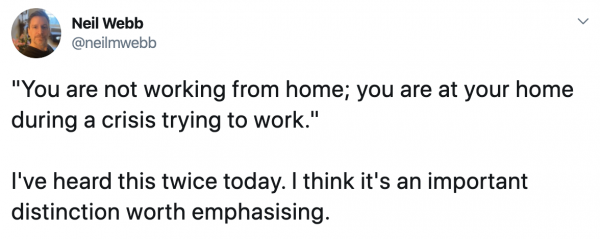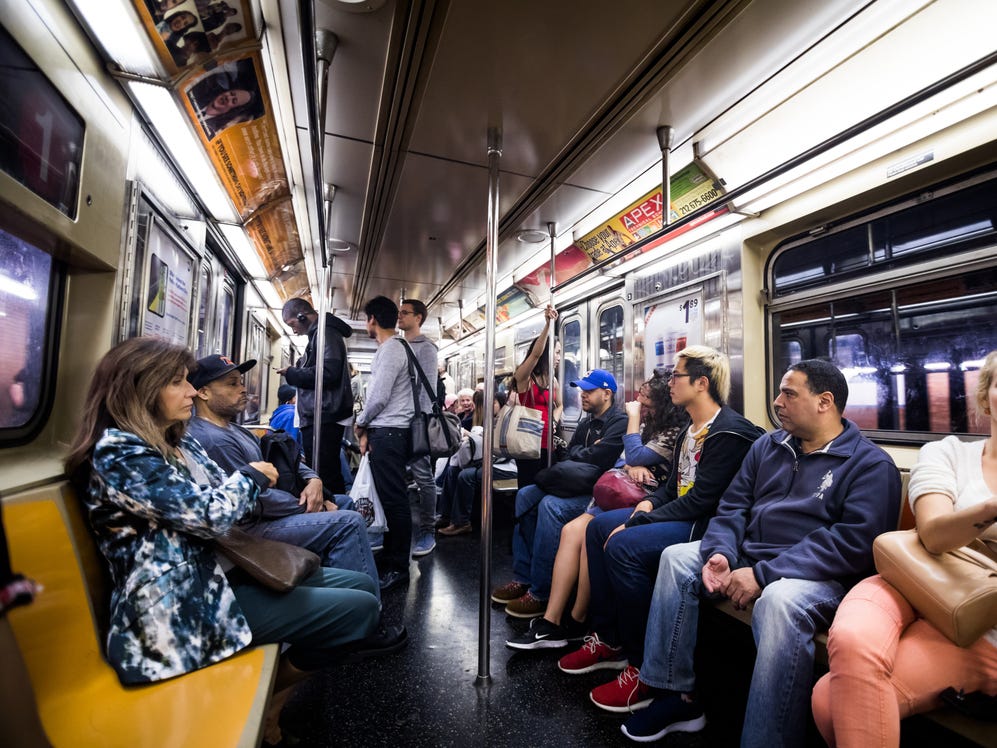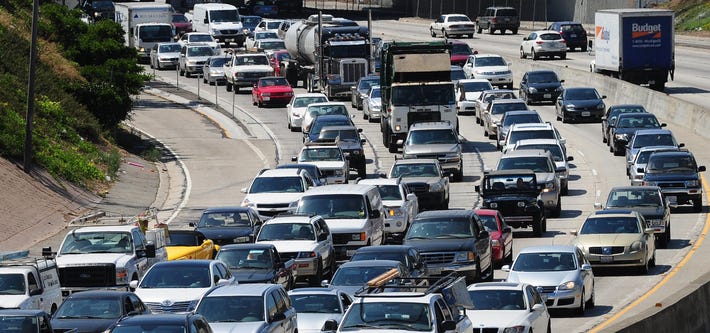Fuck Your Commute
And The Horse It Rode In On #
I ran across an article from the Harvard Business Review this morning that got my blood absolutely boiling.
The title of the article is “That “Dreaded” Commute Is Actually Good for Your Health”.
The title alone was enough to get me angry and set off a bunch of warning bells.
Nothing Can Change So Deal With It, I Guess #
So the first paragraph of the article reads as follows:
We live in a world of commuters. Because of our love of cars and big suburban houses, 75% of Americans drive to work. Long distances. The average American travels 16 miles each way to their office and 220 million spend at least 1.5 hours a day in their cars.
Right off the bat, I’ve got issues. They do say that the “overarching narrative, up until now, has been that this is a bad thing” two paragraphs down. Both of these contribute to this tone of “well this is how things are and we can’t change it so just change how you think instead so this is good”. This is followed up with a quick
Yet, despite a year of working from home, our job satisfaction and general mental health have continued to deteriorate.
This feels pretty weasel-like to me. Like the issue is that people aren’t commuting or working from their offices. It’s not that the pandemic has laid bare the ways our society has been reconfigured to only benefit the powerful. How capitalism is doing it’s darndest to bring feudalism back. Or how after decades of work behind the scenes fascism is staging a comeback tour.
Us having to commute ( which in most cities means “drive your car” ) to work is the byproduct of how our cities and societies are designed. Besides cities being built for cars, there’s the fact that we don’t get paid for our commutes. It’s a pretty reasonable idea, right; if you have to get to a specific place to work, maybe getting paid for your commute can alleviate using up 1-2 hours of your day for travel. Especially if, as the article suggests later, you use your commute to do some work.

Yeah, working from home hasn’t been all kittens and sunshine – but it hasn’t really been “working from home”, either. I’ve seen a number of articles and tweets about how we’re not working from home, we’re at home trying to work during a crisis. Everybody’s lives have been disrupted since the start of the pandemic. Our lives have been turned upside down and we’re all still trying to figure out how to get to a “new normal”.
I’m not going to say that having to be at a specific place or commuting to work shouldn’t be a thing. There are upsides to having a commute, or having your place of work be outside your home. I do sometimes miss my commute into work. It’s when I’d read, listen to podcasts, or just play some video games. I’ve cut down my podcasts to basically just one because I don’t have the time to listen to more than one at a time without my commute. I used to be able to listen to an episode of Behind the Bastards in a day, now it usually takes me two or three.
There was also the additional benefit of a mental space between work and home. Work could be something that was left at the office. The commute home was time to relax and to get into the mindset required to properly leave my concerns and stresses from work back at the office.
On the other hand, it was 2 hours out of every single day of the week that I wasn’t getting paid for. I couldn’t do anything other than read, listen to podcasts, or do stuff on my phone. Taking the bus meant that I never had enough room to use my laptop – I could have done a lot of prep for D&D or writing in that time.
And working from home means I’ve been able to come up with new routines and rituals. I can sleep in a bit later, and my mornings are pretty much stress free because “rushing to work for a meeting” means walking across the hall to my office. I can immediately start working on other things when I’m done work instead of walking to a bus station, taking a 451 minute bus, then walking the rest of the way home.
However, the article only acknowledges the rituals & routines we had before the pandemic:
You wake up at whatever time, stumble downstairs, eat some breakfast, and make a cup of coffee or tea while listening to your favorite podcast. If you have children, a part of your ritual may be dressing them for school. If you have pets, a part of your ritual may be filling their bowls with kibble and taking a walk around the block. At some point, you shower and put on your work clothes. Tie that tie, wrap that scarf, pull that sweatshirt over your head. You get your backpack or briefcase, check your phone for messages, climb into the car or hop onto your bike or run to catch your train — and off you go.
You’ve taken this ride countless times. As a matter of fact, you travel the same route every day. During the commute, you turn on the media — maybe it’s the news, music, an audio book, or talk radio. You show up at work, do your thing, then repeat the whole process in reverse.
It might seem robotic. It might even seem pathetic. But it’s good stuff — for your mind and your body!
Right, because everyone knows that this:

Or this:

…Is a great place for your mind and body, full of quiet rest and peaceful relaxation.
Then they go over the reasons why: structure, initiation and closure, shared experience, purpose, and preparation. Let’s dive into each of those.
Structure #
This is one paragraph basically saying that “humans crave predictability because it means safety”.
Which… completely ignores the fact that people can build new structures, new rituals, new routines when working from home. I don’t have much of a morning routine2; it’s basically wake up, go to the washroom, make myself a drink using the Soda Stream3, take my medication, go to the room I use as an office. Of course, once at my desk I do the same morning routine I had when I had to commute: check email, Twitter, Slack, & Discord to see if there’s anything I need to respond to, otherwise I finish waking up and then get to work.
I know people that have made going for a walk before sitting down to work a new part of their pre-work routine. Coffee lovers get the chance to sit down and enjoy their coffee instead of trying to drink while on public transit – or worse, while paying attention to the road. Other folks can spend more time getting their kids ready for school because they don’t have to rush to work. There are probably folks who enjoy the extra time to work on a hobby or personal project before diving into work-work.
This particular article doesn’t try to imply that we’re bad people for replacing our morning routines where we spend money with ones where we don’t have to. It comes close though, but putting the “ritual” of the commute on the same level as religious services, bedtime, and dinnertime.
Oh, they also have “school days” as a ritual, which is a whole other post that I’m not going to write.
It’s possible to have structure without a commute. I won’t say it’s easy to replace a commute with other ( probably better ) routines. I’ve had trouble adjusting, especially given I’ve moved twice since the pandemic started. Having ADHD can make it hard to build and stick to a routine sometimes. But I’ve slowly settled into a routine that works for me.
What I find pretty odd is that they don’t talk about the structure of a 9-5 job. Is it because they’re trying to stay focused on the commute? Or is it because they know most folks don’t really enjoy the structure provided by work? Yeah, work provides a structure, but it’s a one-size-fits-all structure, which means it’s really a one-size-fits-almost-nobody.
Intiation and Closure #
This single paragraph is basically saying “commutes provide work-life balance!”
Commutes help us separate those two parts of ourselves, set healthy boundaries between them, and avoid burnout.
Right, because your job respects that boundary without question. Bosses never ask you to do more work on your own time, and you’re never asked to come in on your day off. It’s always you that’s messing up that work-life balance, it’s your fault you’re getting burnt out. You’ve just got to be better at setting boundaries!

To me, this way of looking at things is the worst thing to come out of corporate culture since its inception. This way of framing issues so that the problem is you, the wage slave – and never with the company.
You’re getting burnt out because you’re bad at setting boundaries.
You’re not getting a raise because you didn’t work hard enough.
You’re getting fired because of this reason best calculated to keep you from coming back with a gun, and not because our shareholders demanded we cut 500 jobs so they could get more yachts.
It’s this insidious way of looking at things that dovetails perfectly with the West’s notions of personal responsibility and freedom. The problem is always you; not working hard or long enough, or sacrificing enough.
But ignore all that, you need to commute into an office so you can “switch on” a work persona and get all your tasks done.
Shared Experience #
Oh man. Ohhhhhh man.
Quote:
What was the first thing you used to say to someone upon arriving at work or at school? It likely had something to do with your commute. “The 1/9 was so backed up, even the carpool lane was moving slowly,” or, “The L-train was delayed again this morning,” or, “I biked all the way here in the rain!” Prosaic stuff, to be sure, but universal.
Yeah, that commute that we want you to go back to – remember how sometimes it would take two or three times as long because of an accident4? Wasn’t that great? Or that time that someone was so burdened by debts and stress that jumping onto the tracks felt like a better option than going into work? These are just dilemmas you experience on your way to work! You’re not going to be stressed out about being late and thus be snappy and unfun to be around when you get to work! No, you’re going to bond with your coworkers about how all us cogs sometimes break down and how that inconveniences the rest of us.
Then they end with this:
You and your coworkers or peers are people of the same club: You are commuters. For the day, week, year, or decade, you are bonded by a common struggle. That brings you closer. That makes you better colleagues. That alloys you in social contract.

No. Fuck you. Fuck you. Fuck you.
Bonded by the hell that can be commuting to work?

No. Nope.
It’s not that wages haven’t risen while productivity has soared, or that wage theft is the largest form of theft in the world, or the pay disparity that women & minorities face, or that billionaires make more in a month than most of us make in a year, or how little time we have to relax lately, or one of many many many other ways corporations and capitalism is constantly fucking us over.
Nor is it sports, movies, books, tv shows, the outdoors, food, shared experiences, or any of a million potential shared interests we can use to bond with coworkers.
No, the thing that we all really bond over is our shitty commute.
Like, this is as stupid to you as it is to me, right? I haven’t been brainwashed by memes and Twiter and Tumblr, and this is actually a hilariously stupid take on why we need commutes?
Fun fact that I learned from an episode of Behind the Bastards: people in cults and other abusive situations bond over their shared trauma. This can make it harder to leave that abusive situation, because those are bonds that mean something – they can be stronger than family ties. Ask anyone who’s lost a relative to a cult, or someone who can’t leave an abusive household because they can’t bear to leave their siblings behind?
This paragraph is your boss saying “yeah your commute is a stressful trek through a hellscape of cars, but think of the bonding you’ll do with your coworkers”, followed by a quick “but no time off to go visit a shrink to deal with these stresses we force on you”.
If there was ever a piece of evidence for “capitalism == brain worms”, this fucking paragraph is it.
Purpose #
Oh boy, after the shit show that was “shared experience”, I bet “purpose” is gonna be great.
I’m gonna start by showing you the whole paragraph, then we’ll go over this one in detail.
In those many or few minutes on the way to and from work, we often recall our purpose. We are employed for a reason — whether it is to support ourselves or our loved ones, create change and better society, or pursue our passions. Our purpose is the reason for loading ourselves into the car or the train or the bus every day. And at that moment, our existential propane is ignited. Why we’re here is clarified. We’re here to strive and provide. We create value through our unique talents. We achieve and help others to achieve. Commutes help us to reconnect with all the purposes that working taps into, a precursor to improved productivity and job satisfaction.
I swear to god this whole damn article was written by a character from 1984.
Anyways.
In those many or few minutes on the way to and from work, we often recall our purpose.
Yeah, if few means “at least half an hour”. The average one-way commute has only gotten longer in the last few years. Plenty of time to recall that “purpose”.
We are employed for a reason — whether it is to support ourselves or our loved ones, create change and better society, or pursue our passions.
Ah, so our purpose is a high ideal – supporting our families, creating better societies, pursuing our passions.
So the mail intern – that job is their passion? The accountant on the next floor up? What about them; did they dream of spending hours crunching numbers to show a 0.01% increase in widget sales? I know I didn’t dream of building basically the same thing over and over again. As a kid I dreamt about making video games5, not tweaking CSS rules so that the front page is pixel perfect or spending days fixing a critical issue.
The saying “do what you love and you’ll never work a day in your life” is saying the same thing as this sentence. It’s also the same gas-lighty bullshit from the “shared experience” section.
“If you’re not passionate about your job then it’s you that’s at fault.”
I’m not saying we should get rid of jobs that people aren’t passionate about. We need garbage men, janitors, health care workers, scientists, and hundreds of other professions that keep us safe and healthy in our modern world. And there are for sure people out there that are passionate about their job as a garbage man; but I’d be willing to bet that they probably didn’t start out being passionate about that job.
Also, saying you need to be passionate about your job probably accounts for a lot of burnout – cause if you’re not passionate then the problem is you, right?
Anyways, trying to align “the things you’re passionate about” with “your job” is baloney. We go to our jobs and work because we live in a capitalist society which means I need money to eat and have a roof over my head. If we had Universal Basic Income, maybe I could figure out what I’m passionate about and then do that for fun without having to spend the bulk of my adult life dealing with stress and burnout.
Our purpose is the reason for loading ourselves into the car or the train or the bus every day.
More nuggets of wisdom.
I feel like this is the mindset that has gotten us to where we are now; or at least is responsible for most of the bad stuff.
-
Your purpose is to work, because then you have value.
-
You need value to exist in society, so that’s why you need to commute to work
Or, to flip this around and explain the problem the right has with just giving people money so they can live:
-
If you can’t work, you don’t have a purpose.
-
If you don’t have a purpose, why are you alive?
It just feels like we keep having to deal with the puritanical “work gives us purpose” mindset that makes up part of the foundation of all Western societies.
And at that moment, our existential propane is ignited.
Personally, commuting does a better job of cutting off my supply of “existential propane” than it does to light it.
Commuting is the time we all try to ignore all the stuff we could be doing if we didn’t have to go into work. The projects we want to work on, the places we want to go, the things we want to do – all these things that have to be put aside on a shelf so we can go into work and earn a paycheque.
It’s a shared existential nightmare, and the pandemic helped us wake from it.
Why we’re here is clarified.
It’s to work, right?
We’re here to strive and provide. We create value through our unique talents. We achieve and help others to achieve.
I’m putting these ones together because I don’t feel like I can talk about them separately.
Coming after the last two sentences, “[w]e’re here to strive and provide” feels particularly chilling to me. Your purpose, the thing that “ignites your existential propane”, what your commute should make clear to you is that your only purpose is to strive and provide.
Provide what? Value, of course!
How do we provide that? By achieving and helping others achieve!
Achieving what, though? Meeting the quarterly targets? Getting that TPS report done on time? Signing up more people for the reward card than you did yesterday6? There’s a reason that what exactly it is you’re achieving is left vague.
What value do our achievements produce? Few of us actually get to benefit from what our labour provides, so all we achieve is to sell our youth and health so someone else can make a profit. The value we create is for the stockholders and CEOs, not you. You can’t enjoy the value you create, anyways. You should be too busy striving and providing to care about the value you create!
This is an attempt to bring everyone back to the “old normal”, pre-pandemic times and how things worked. Managers got to feel important by getting in the way, and get their little thrill from seeing everyone at their desk and working. Upper management and CEOs got to feel like powerful kings and lords with their legions of subjects toiling away for the benefit of their betters.
Everything was better before the pandemic, let’s just go back to that – where you don’t have the time to think about how your life could be better because you’re too busy thinking about how to make me more money.
Commutes help us to reconnect with all the purposes that working taps into, a precursor to improved productivity and job satisfaction.
Really? Commutes don’t objectively make our lives worse and shorter by affecting our physical and mental health? Working from home doesn’t save people money they’d otherwise spend on their cars (gas, insurance, maintenance), on food, or on work clothes?
Preparation #
This section is the longest yet. It makes me wonder if this is why the author of the article wants their commute back instead of continuing to work from home.
This sentence in particular sticks out to me:
Working from home, the seconds between eating breakfast and hopping on your first Zoom call aren’t enough, just as the seconds between your last Zoom call and dinner aren’t enough to prepare you either.
If you want me to work on my commute, pay me.
Again, that puritan work ethic comes back: if you didn’t work hard enough to get the thing done, work on your own time. How about instead we push back and demand more reasonable deadlines so people don’t have to do unpaid work? How about instead of demanding one person do several jobs, you hire more people so that person you hired to do X can actually do X7? How about instead of holding multiple hour long whole-team meetings you let your employees get their work done.
Also, the last bit of the sentence just kills me: “just as the seconds between your last Zoom call and dinner aren’t enough to prepare you either”. Right, so that meeting that went 10 minutes over time – instead of being able to just walk to your kitchen and sit down for dinner, we want you to spend half an hour or more getting home so that everybody is hangry.
Great plan.
Before I started working from home, I would often get home at or past 7pm. This was due to a combination of factors: working a bit late to wrap something up, a meeting running long, traffic just particularly sucking. Even when everything worked out I think the earliest I got home was 6:30 simply because of all the other parts of my commute outside the 45-ish minute bus ride. But since I started working from home, I’ve found I’m able to be done working at 5pm. Without a boss standing over my shoulder it’s easier to say to myself that it’ll be better to come back to a problem when I’m well rested. Instead of working late and adding more bugs, I’ll come back the next morning and solve the problem in like ten minutes.
It’s lot easier to remember that my time is mine when I’m not stuck in a grey office or inside a too hot or too cold8 bus.
Wrapping Up #
Okay, this post is long enough. I think it’s the longest thing I’ve written on this site, ever.
No One-Size-Fits-All #
First thing to address is that yes – some people prefer working in offices. Some people have trouble creating the structures and routines on their own, so commuting to an office provides that for them.
That’s fine! If you love and miss your commute, I don’t have an issue with you. If the only way you can get stuff done is to come into an office so your young children don’t interrupt9, all power to ya.
My problem is with businesses trying their hardest to force everyone back to the office. I really wonder how much of this is middle managers desperately trying to justify why they’re needed when plenty of folks are more productive at home. Or how much is that they’ve been told they can’t do as many video meetings with the whole team because it’s exhausting and demoralizing ( although I find it funny that a bunch of the symptoms of “Zoom Fatigue” are the same most people feel about meetings in general ).
Or how about how disabled people who have asked for years to be able to work from home finding that the only reason they weren’t allowed to work from home before was basically just ableism?
All these articles and tweets and news segments just feel like people in management positions being terrified of giving up a tiny bit of the control they hold over their workers. They’re scrambling to come up with reasons why everyone should just go back to working in an office.
Personally #
I much prefer working from home.
I have days where there isn’t much for me to do – usually for a variety of reasons. I’m waiting on someone else to finish something. Something I thought would take hours only took a few minutes. Maybe the only task I’ve got on my plate can’t even be started until tomorrow anyways. But being able to just relax and go out for a quick walk without having to worry about a sudden meeting? Being able to have a video game running so I can come back to it while waiting for something to compile10?
It. Is. Fantastic.
I still get all my stuff done, but life has become much more relaxed and stress-free since working from home.
A lot of that is not dealing with the stress of commuting; no dealing with late busses ( or just missing a bus ), bad traffic, or crummy weather.
I’ve got about two extra hours each day to do other stuff, stuff that actually brings me joy and that I can find purpose in.
Sure, there are things I miss some days. I definitely played way more video games when I commuted, the Nintendo Switch was perfect for that. Video meetings are never going to be as good as in-person meetings with a whiteboard. Pair programming is easier when you’re both looking at the same physical screen. Being in-person is objectively better for some things.
But for me11 there are ways to bring back the good stuff about working in an office without giving up working from home.
Working remotely means not having to pay for office space; so why not use some of that money to rent a room in a co-working space if you need to have a meeting with a whiteboard? Or even just meet at a cafe or something. I know this doesn’t work that well for companies where they’ve got remote workers all over the world. On the other hand, most companies with remote workers spread across the globe were probably doing remote work before the pandemic and have figured out their own solutions.
As for not having a commute to do some reading, or listen to podcasts – well I’ve got that time now, I can still use it to do that kind of stuff. After a few months of working from home I got into the habit of reading for a bit before going to bed, it’s been great! As for podcasts, I still listen to them when I’m driving somewhere for an errand or I’m working on a project.
Oh, and I feel like I’ve actually got time to work on my hobbies. My passions, if you will.
Okay, Wrapping Up For Real Now #
I think this whole thing has made clear that I prefer working at home. I hope I’ve also made it clear that I’m fine with people who prefer to work in an office.
I just wish that all the benefits of working from home and the problems with working in an office were understood by the kind of people who write this article.
Yes, there are benefits to working in an office – for some people. For the majority they’re fine either way, and on the opposite end of the bell curve offices are hell for some folks. So why not just allow either?
It feels like the same problem with open-plan offices and how they’re actually terrible for workers. A decision was made on “how things are”, and we can’t change now because… reasons.
It also feels like the problem with working from home is that it creates more work for managers. Can’t just call everyone into a meeting room for a “quick meeting”, have to schedule it ahead of time. Booking a coworking space and herding everyone so they’re there on time can make it abundantly clear how useless this meeting is, and could probably just be an email.
Basically, it feels like all the middle managers whose job is wrangling people into meetings are finding out they’re not really necessary and are panicking, hard.
I just hope that all the articles about how working from home or hybrid systems12 are here to stay prove to be more true than the ones saying we all need to go back to commutes and working in offices.
-
On a day with good traffic, most days was closer to an hour, bad days ( about one every two weeks or so ) could be closer to two hours ↩︎
-
I’m not much of a morning person at all, really ↩︎
-
I don’t drink coffee, and got a Soda Stream so I could cut out Coke Zero. I just have bubble water with some Mio in it. ↩︎
-
Probably someone driving unsafely so they could get to their second or third job on time, caused by the stress of working multiple jobs or the lack of sleep from the same ↩︎
-
Back when “making video games” was the fun job you see in advertisements and whatnot, not the hellscape of crunch and burnout we know it is now ↩︎
-
True story: when I worked at EB Games I was the best at getting folks to sign up for the rewards card, which looking back at it now seems like such a waste of energy ↩︎
-
I’ve heard ( and have many of my own ) horror stories about people hired for a specific job who then spend the majority of their time not doing that thing because rather than hire more people they just gave the employees they already have more responsibilities ( without increasing their pay, of course ) ↩︎
-
Or in Vancouver, too humid ↩︎
-
Believe me, I know how much distractions can suck away productivity ↩︎
-
“Compiling” here being any task that takes more than a minute to complete but runs on its own without needing input or supervision. Working with Go my code usually compiles pretty fast but deployments still take a while, or sometimes the compiled binary just takes a while to do whatever it is it needs to do ↩︎
-
And probably most people ↩︎
-
IE, spending a day or two in the office and the rest of the week at home ↩︎
